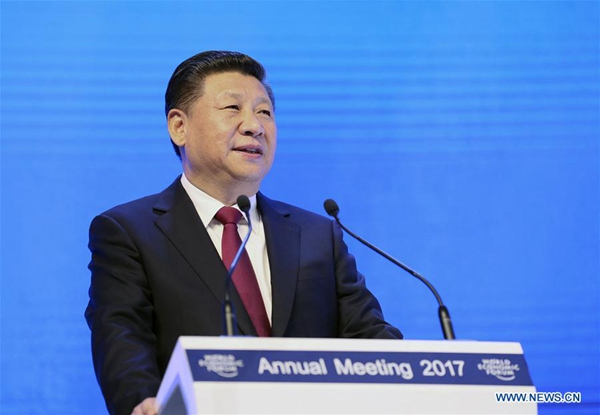Lenin, Xi and Chinese version of globalization
china.org.cn / chinagate.cn by Ritu Raj Subedi, March 22, 2017 Adjust font size:
|
|
|
Chinese President Xi Jinping delivers a keynote speech at the opening plenary of the 2017 annual meeting of the World Economic Forum in Davos, Switzerland, Jan. 17, 2017. (Xinhua/Lan Hongguang) |
During this year's World Economic Forum (WEF) in Davos, Chinese President Xi Jinping was a key attraction for the global elites. Xi, also general secretary of the Chinese Communist Party, held the captains of financial industries spellbound with his keynote speech in which he expressed China's commitment to defending globalization and free trade in the wake of Brexit and the new U.S. president's protectionist rhetoric.
On the occasion, former Swedish Prime Minister Carl Bildt offered his historic analogy. He compared Xi's proactive remarks with the revolutionary act of Russian communist icon Vladimir Lenin. He said that a century ago, Russian Bolshevik leader Lenin was engineering world revolution in Zurich, a couple of hours' train ride from Davos.
"And now, 100 years later we have the leader of the largest communist party in the world coming to the leading meeting of global capitalists to preach the virtues of globalization," he told AFP.
Of course, this comparison bears historical significance. Lenin and Xi represent different eras and temperaments. Lenin had led the October revolution that changed the political map of the world. It inspired scores of revolutionaries, including Chairman Mao, who presided over the China's New Democratic Revolution in 1949. While in Zurich in 1916, Lenin wrote his famous book "Imperialism: the highest stage of capitalism" that served as an ideological guideline for many communists across the world.
When Lenin heard that political upheavals were underway in Russia, he boarded a train in Switzerland on April 9, 1917 to return to St Petersburg via Germany. Six months later, the Bolsheviks took control of Russia through the revolution.
It is here worth mentioning that Lenin's "New Economic Policy (NEP)," introduced to replace the War Communism in 1922, allowed the private sector to run businesses and form capital. Lenin himself described it as "state capitalism" deemed as a necessary requisite for socialist construction. It gave a respite to the peasants and checked the economic downturn in the Russian civil war. It is widely believed that the elements of free markets and trade contained in the NEP had influenced Chinese paramount leader Deng Xiaoping in launching reforms and opening up.
Nonetheless, things have changed a lot since the time of Lenin. There has been a transformative shift in capital, technology and ideology. Ruthless capitalism has itself mellowed to a greater extent with its cyclic crises. In order to save the system, many capitalist democracies have embraced socialist contents while weathering depression and recessions that are hitting it on the trot.
Unlike the radical Bolshevik leader, Chinese communist leader Xi is striving to bring about peaceful economic revolution that is win-win for all nations and people. He called for democratizing the global institutions created to maintain economic and political order in the aftermath of World War II.
In his mesmerising speech, Xi said that "the principal challenge is not to alter the historical course and cancel globalization but to chart the right course for [it]." While calling for strong regulation, he stressed on the "implementation of structural reforms with a combination of old engines with new technologies, the transformation of a global governance scheme whereby emerging economies will gain better representation and the combating of poverty and inequality."
Then what are the differences between the U.S.-led globalization and the one aspired to by China? It appears that the Chinese version of globalization has no elements of hegemony. Development of infrastructure and self-sustaining economies characterizes China's overseas economic drive.
"The China-led globalization is based on the notion of self-help, mutual interdependency, infrastructure development and the respect for territorial integrity of nations," said Dr. D R Dahal, a political scientist.
According to him, China does not want to impose its ideology and values on the nations where it has greater economic leverage.
"The west seeks to exercise its hegemony through the human rights instruments along with the expansion of trade and investment but this is not the case with China, which has risen on the global stage peacefully," Dr. Dahal said.
Against this backdrop, President Xi's Belt and Road Initiative (B&R) has appeared to be a robust vehicle of globalization. It aims at enhancing connectivity and cooperation among the nations. Like socialism with the Chinese characteristics, globalization with Chinese characteristics is going to leave its imprint across the continents. President Xi should rejig the globalization process so that it will get a human face and benefit the entire humanity.
Ritu Raj Subedi is an associate editor of The Rising Nepal.
Opinion articles reflect the views of their authors, not necessarily those of China.org.cn.
